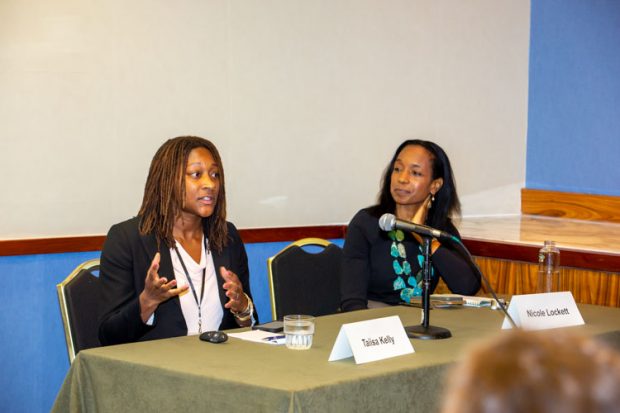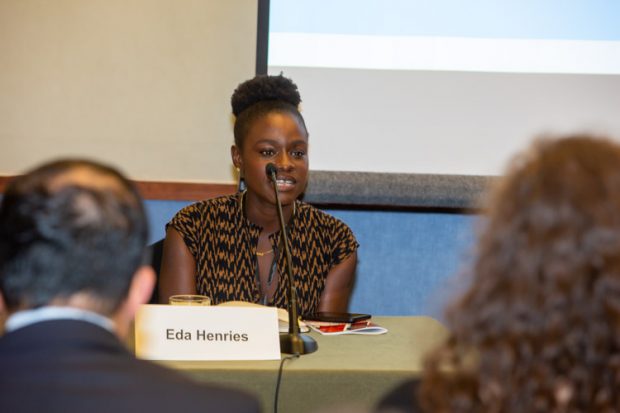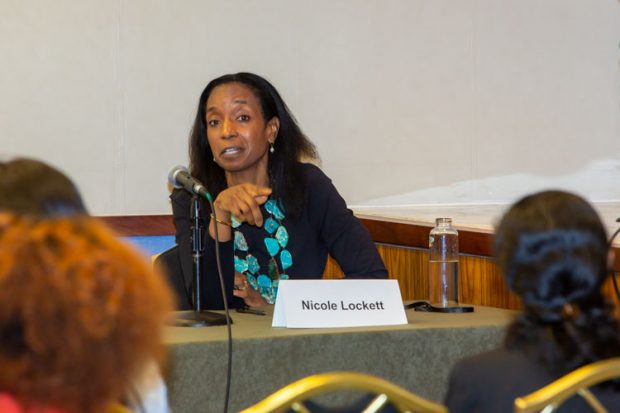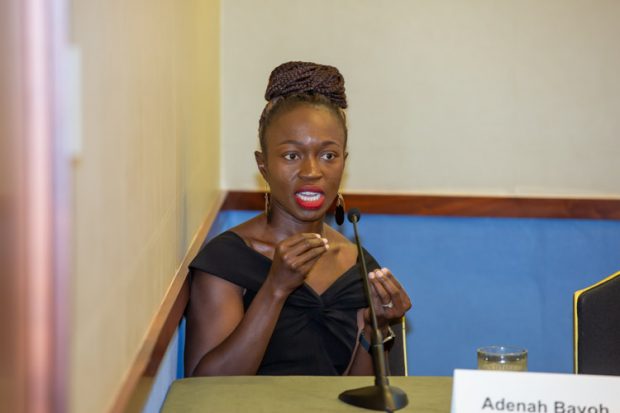New Jersey Future Blog
The Changing Faces of New Jersey Developers
July 18th, 2023 by Paula Figueroa-Vega

The Changing Faces of New Jersey Developers session at the 2023 NJ Planning & Redevelopment Conference. Photo by Frank H. Conlon
“Nationally, Black and Hispanic people are acutely underrepresented in real estate development…Black and Hispanic real estate developers represent less than 1% of their industry across the nation, even though Blacks make up 14% and Hispanics make up 18% of the total population. New Jersey’s affordable housing development space shows similar disparities. Between 2009 and 2023, of the 53 developers that received 9% low-income housing tax credit (LIHTC) awards in NJ, only three were Black or Hispanic-led/owned. Combined, they were awarded barely 3% of all the 9% LIHTC funding distributed in the past decade.1” These sobering statistics set the background for an engaging discussion during The Changing Faces of New Jersey Developers session at the 2023 New Jersey Planning and Redevelopment Conference, which featured four developers who have overcome challenges to shape and create their own paths in this field.

Taiisa Kelly, CEO of Monarch Housing Associates, speaking during the 2023 NJ Planning & Redevelopment Conference. Photo by Frank H. Conlon
The session was moderated by Taiisa Kelly, CEO of Monarch Housing Associates, and included affordable housing developers Adenah Bayoh, Founder and CEO of Foya Development; Eda Henries, Founder and Managing Principal of Henries & Co.; and Nicole Lockett, Managing Director of Development of Genesis Companies. They represent a rising generation of Black, Indigenous, and People of Color (BIPOC) leaders in housing and economic development who are creating a community to support each other.
The experienced developers grounded the panel in practical advice. All panelists have a successful track record of developments in New Jersey and are fighting together for individual opportunities to improve our communities: Lockett is one of those three aforementioned developers of color; Bayoh is heavily focused on affordable housing and restaurants; and Henries founded a capital advisory firm that serves small and medium-sized privately held companies. Finally, Kelly has experience in housing development, working with federal, state, and local funding sources to secure financing for special needs housing projects.

Eda Henries, Founder and Managing Principal of Henries & Co., speaking during the 2023 NJ Planning & Redevelopment Conference. Photo by Frank H. Conlon
The presenters’ journeys and reasons for becoming developers varied, reflecting numerous points of entry that were not motivated solely by business opportunities that exist in the housing market. Nicole Lockett’s journey began with volunteer work at the non-profit that her father was a board member of where she found a genuine passion toward the affordable housing industry and saw it as a way to assist people. Eda Henries, a registered broker brought into the field by Adenah Bayoh, explained that she was drawn to the financial aspects of the projects. Bayoh, on the other hand, grew up in affordable housing and views this work as an opportunity to create community spaces where people can gather. All expressed, in one way or another, that being a developer has provided an opportunity to create a new market, improve access, help people, diversify the leadership in the space, and build an ecosystem. They want to see others that look like them building more affordable housing. Lockett, who has years of experience in the business, explains that her motivation has evolved. While she still is “absolutely moved by residents” and recently opened a senior building, she comments that now, “I’m focused on growing developers.”

Nicole Lockett, Managing Director of Development of Genesis Companies, speaking during the 2023 NJ Planning & Redevelopment Conference. Photo by Frank H. Conlon
Lockett, who has years of experience in the business, explains that her motivation has evolved. “I’m focused on growing developers.”
Panelists discussed the role of policies and initiatives in incentivizing access to who gets to create affordable housing. “There is money in this space,” Lockett said. Laws and congressional acts support affordable housing initiatives, but the details are often hidden in lengthy bills. Advocacy is necessary to reduce the barriers embedded in regulations. The creation of rational policies depends on education and legislation. Unfortunately, some programs exclude the very people they are intended to help. Bayoh spoke about the need to focus on equity rather than equality when distributing public funds. The billion-dollar industry of affordable housing is heavily subsidized, making it crucial that tax money is distributed equitably, taking into consideration that not everyone has the same tools to compete.

Adenah Bayoh, Founder and CEO of Foya Development, speaking during the 2023 NJ Planning & Redevelopment Conference. Photo by Frank H. Conlon
One of the themes reiterated throughout the session was the importance of networks, especially for BIPOC developers. They suggested, “Get to know your mayor, the planner in your town, and know that there will always be opposition.” To effectively expand the development of affordable housing, it is crucial to be intentional. To do this, it is essential to build relationships. If you are interested in getting involved, the speakers suggest: “Start now.”
Bayoh closed the session by sharing a reflection and a call to action. She asked the packed room to imagine that instead of investing resources as the United States had done in the “war on drugs,” we directed that energy towards addressing the lack of affordable housing. Envision a “war on lack of affordable housing” and consider the possibilities of utilizing that energy to guarantee affordable housing for all.
__________________
1Data courtesy of the May 2023 Grove Impact report: Breaking the Glass Bottleneck: The Economic Potential Of Black And Hispanic Real Estate Developers And The Constraints They Face
Related Posts
Tags: Affordable housing, BIPOC leaders, developers, Development, Economic development, equity, Housing, housing and equity, leaders, leadership
















